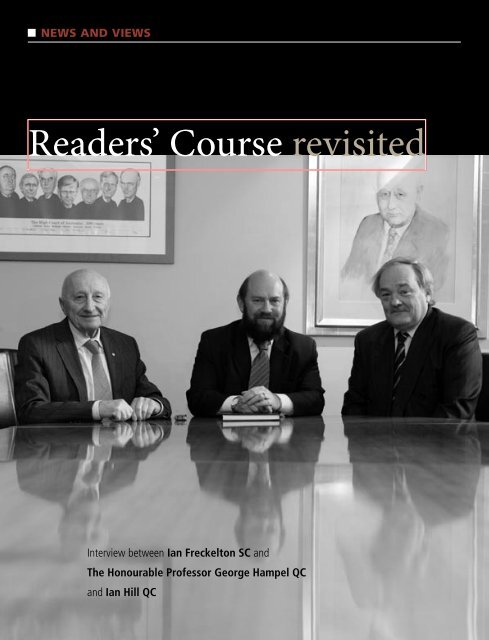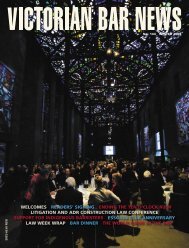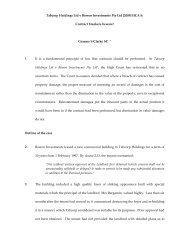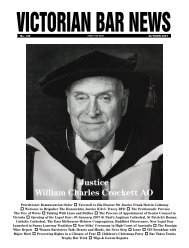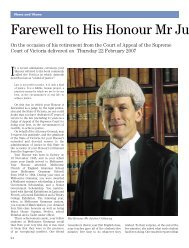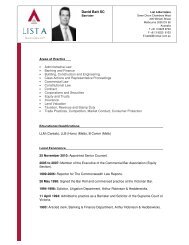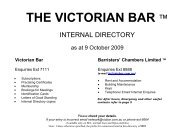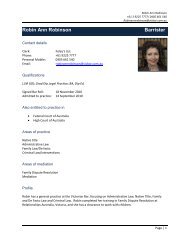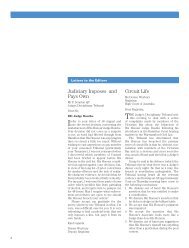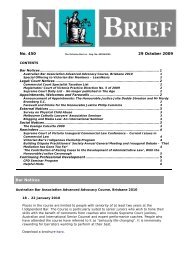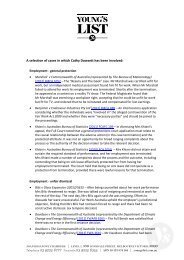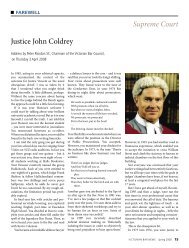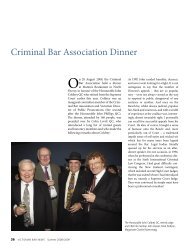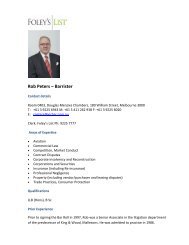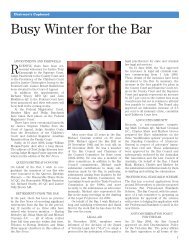Readers' Course revisited - Victorian Bar
Readers' Course revisited - Victorian Bar
Readers' Course revisited - Victorian Bar
You also want an ePaper? Increase the reach of your titles
YUMPU automatically turns print PDFs into web optimized ePapers that Google loves.
NEWS AND VIEWS<br />
Readers’ <strong>Course</strong> <strong>revisited</strong><br />
Interview between Ian Freckelton SC and<br />
The Honourable Professor George Hampel QC<br />
and Ian Hill QC<br />
24 VICTORIAN BAR NEWS Summer 2008 / 2009
IF: The <strong>Victorian</strong> <strong>Bar</strong> Readers’ <strong>Course</strong><br />
is about to have its 30th anniversary.<br />
With your long involvement in advocacy<br />
training, you must both have seen many<br />
changes in the course since the heady days<br />
of 1979?<br />
GH: We have indeed and of course ours<br />
was the first in Australia and it took me<br />
years to persuade our New South Wales<br />
colleagues that they should start one.<br />
They laughed at the proposition in the<br />
beginning, saying that barristers don’t<br />
need advocacy training – you’ve either got<br />
the gift or you haven’t. Finally they saw the<br />
light and started their own course about<br />
ten years after ours began. Our Readers’<br />
<strong>Course</strong> is generally acknowledged as the<br />
best around, and in recent years we thought<br />
we should review how we can keep it that<br />
way.<br />
IH: Issues being canvassed in the review<br />
of the course are whether there should be<br />
entrance examinations and whether people<br />
should be able to start the course straight<br />
after completing articles or Leo Cussen.<br />
IF: Are there restrictive trade practice<br />
issues about that?<br />
IH: There may well be but you can’t get<br />
a full practising certificate as a solicitor<br />
before you’ve practised for 18 months after<br />
articles and more for after Leo. We are<br />
allowing people who could not practise in<br />
their own right as a solicitor to practise in<br />
their own right as a barrister. Now I know<br />
there are differences with trust accounts<br />
which we don’t have but all those things are<br />
being examined. We are looking afresh at<br />
the content of the course, examinations at<br />
the end, and assessment during it. Part of<br />
the professionalisation is utilising George<br />
Hampel’s Advocacy Manual (written with<br />
Elizabeth Brimer and Gabriel Kune).<br />
IF: How does the book come into the<br />
course reassessment?<br />
IH: The book is a very good resource for<br />
readers but there is more than that in terms<br />
of further professionalising the course. We<br />
are looking at better educating our instructors<br />
so they can teach better and assess in a<br />
way which gives effective and fair feedback<br />
to the students.<br />
GH: The focus on instructors is very important.<br />
There is a misconception in just<br />
about every field of skills training that because<br />
you are good at what you do therefore<br />
you can teach. That just isn’t right. We<br />
want to train our instructors in the same<br />
way that instructors in other places, including<br />
universities, are trained these<br />
days.<br />
IH: We are looking at certification for<br />
instructors at different levels. That might<br />
mean that some of those who can teach<br />
may not be permitted to assess. There<br />
are different skill sets for which there<br />
need to be different levels and kinds of<br />
proficiency.<br />
GH: One option is to learn from developments<br />
in the United Kingdom. Since we<br />
introduced the training concept there in<br />
the mid ’90s they have come a long way.<br />
One of the things they do very well is to be<br />
very strict about training their teachers<br />
and they don’t permit people to teach unless<br />
they are satisfied that they are at a particular<br />
level. They grade them and teach<br />
them and have their teaching proficiency<br />
reviewed every two or three years. In that<br />
respect they have an edge on us.<br />
IH: I have just read the Attorney-General’s<br />
column in the recent <strong>Bar</strong> News suggesting<br />
that perhaps chambers should provide an<br />
income for readers as they do in England<br />
at about the minimum wage for a legal<br />
executive.<br />
IF: What do you think of that idea, Ian?<br />
IH: We are looking into it but I don’t<br />
think it will happen here. There are significant<br />
differences between England and here.<br />
We have a very low cost Readers’ <strong>Course</strong><br />
($3771) if you compare it with higher education<br />
costs at university. To do one subject<br />
in a Master’s degree costs much the same as<br />
to pay for the Readers’ <strong>Course</strong>.<br />
GH: It shouldn’t be forgotten, too, that we<br />
provide a place for an indigenous reader<br />
and for up to four readers from the South<br />
Pacific region. We currently have four<br />
from Papua New Guinea.<br />
IF: That has been one of the real achievements<br />
of the course – to stretch out a<br />
helpful hand to our neighbours.<br />
IH: Yes. I think the <strong>Victorian</strong> <strong>Bar</strong> is very<br />
well respected in the South Pacific. In fact<br />
we have had contact from Fiji wanting us<br />
to go there to put on an appellate advocacy<br />
course.<br />
IF: There’s a growing awareness of appellate<br />
advocacy, isn’t there. There’s been a recent<br />
book by Blank and Selby about that subject<br />
which seems to have been well received so<br />
far, but it’s been one of the neglected areas<br />
until recent times.<br />
VICTORIAN BAR NEWS Summer 2008 / 2009 25
The Honourable George Hampel QC<br />
GH: Yes, that’s right because I think that<br />
most advocacy training has to date or<br />
almost to date been treated as for beginners.<br />
There’s been a culture in the legal profession<br />
that once you’ve done your basic<br />
training that’s all you need to do. But we are<br />
now developing much more into ongoing<br />
education across the board in law, but<br />
including in advocacy. Just a couple of<br />
months ago we did the <strong>Bar</strong> cross-examination<br />
workshop for the English <strong>Bar</strong> in London<br />
and we did one in Darwin just recently.<br />
So there is a lot of that coming along but it’s<br />
only a fairly recent development. We are<br />
hoping to introduce a bit of that culture to<br />
our <strong>Bar</strong>. One of the things that we might<br />
look at as part of the review is whether<br />
there should be either as part of or as an<br />
addition to the Readers’ <strong>Course</strong> an obligation<br />
to do a supplementary course of short<br />
duration after people have been in practice<br />
for, say, 12 months or two years.<br />
IF: It’s interesting, isn’t it, that we have<br />
mandatory attendance now at continuing<br />
professional development lectures but for<br />
most of us our real stock in trade is advocacy<br />
and there’s no mandatory ongoing<br />
professional development in that regard.<br />
GH: The main attendance at the Advocacy<br />
Institute courses for barristers is at the<br />
more senior level. I couldn’t tell you the<br />
numbers with precision but over the years<br />
we have had some 60 or 70 silks overall attend<br />
them. We have had teachers like<br />
Gleeson, Kirby, Jackson, Bennett, Burnside,<br />
Felicity and myself. It works and that’s<br />
really terrific. So that’s what I’d like to encourage<br />
in terms of changing the culture at<br />
all levels of our <strong>Bar</strong>.<br />
IF: Looking at the changing times then,<br />
what are the main elements of change in<br />
advocacy styles that you have both noticed<br />
in the courts over the duration of our<br />
Readers’ <strong>Course</strong>?<br />
IH: Well, I think when I first came to the<br />
<strong>Bar</strong>, we used to shout at witnesses and we<br />
used to rough them up and it was sort<br />
of war. Now it’s more subtle and more<br />
effective.<br />
GH: It’s much more issue driven now.<br />
Judges, and I think juries, don’t want<br />
to waltz around. They want to get to<br />
the point. There is a greater focus on<br />
conceptualising your case, getting to a case<br />
theory, and going for it. That has made a<br />
vast difference because people are actually<br />
forced to think about what they are going<br />
to do, in advance, instead of waiting to see<br />
what happens.<br />
IH: It is also very handy before a jury<br />
because not only do the jurors know what<br />
the issues are but you get a chance to lay it<br />
out and impart your defence.<br />
GH: And it enables a judge to better decide<br />
admissibility and relevance issues as<br />
they arise. The trend is apparent in the<br />
appellate courts too where the judges will<br />
say: ‘What’s your best point?’ And there’s<br />
also the trend towards more and more<br />
paperless trials. That is going to keep on<br />
growing. Even in the last five years or so<br />
there have been a number of trials where<br />
everything has been up there on the<br />
screens. The <strong>Victorian</strong> Law Reform Commission<br />
Report on Civil Justice is looking<br />
to facilitate such developments too.<br />
IF: I’ve observed greater use of written<br />
submissions across jurisdictions.<br />
IH: Certainly. I’ve been noticing that<br />
in crime in particular, where written<br />
submissions are becoming much more<br />
common than they used to be. Counsel will<br />
start by handing up an outline of written<br />
argument, be it to a magistrate or a judge,<br />
and then speak to the written outline. I’m<br />
sure that that is being found helpful by the<br />
Bench but it requires different skills than<br />
those in traditional oral advocacy.<br />
IF: In terms of style, do you think we’ll<br />
move to usage of multimedia in closing<br />
and opening addresses using PowerPoint<br />
and similar? That would be another shift<br />
in our longstanding dependence upon oral<br />
presentation.<br />
GH: We all keep saying that a picture<br />
is worth a thousand words but so far we<br />
are using forms of presentation that are<br />
not oral in only certain situations. We<br />
use diagrams and charts, simulations and<br />
re-enactments. That must evolve further.<br />
IH: I agree. We are starting to use aidememoires<br />
and summaries and chronologies<br />
much more now than we used to. Why<br />
can’t they be used electronically?<br />
IF: If there is going to be more use of<br />
computer-generated images in court, this<br />
will impact on advocacy skills. It will need<br />
to be part of the advocacy training of the<br />
future.<br />
IH: Bearing in mind that most of the<br />
readers that we see now have been through<br />
university in more recent times, and as<br />
a result are computer literate, that has to<br />
be so.<br />
GH: There’s a fair bit of work being done<br />
at the National Institute of Trial Advocacy<br />
in the United States about that. We haven’t<br />
started doing that yet but the concepts are<br />
the same; it’s the application that’s differs<br />
somewhat. It’s long overdue in the sense<br />
26 VICTORIAN BAR NEWS Summer 2008 / 2009
Ian Freckelton SC<br />
of the need to start thinking about things<br />
beyond the traditional areas that we have<br />
taught. Nonetheless, everyone has to have<br />
the basic skills and one of my worries has<br />
always been that you constantly encounter<br />
advocates without them. If you haven’t<br />
got the basic skills, it’s hard to build on<br />
something further.<br />
IF: What are some of the developments in<br />
thinking about advocacy training?<br />
GH: One of the issues recognized internationally<br />
is the need for a statement of the<br />
basics so that you get a new teacher or any<br />
teacher or any pupil to a point where they<br />
have a good grip of the fundamentals.<br />
IF: And how does your Advocacy Manual<br />
lock into those issues?<br />
GH: The Manual attempts to create the<br />
sort of basic structure that everyone must<br />
have. It’s the minimum that everyone<br />
needs, from which more can be built. It is<br />
really a combination of what everyone has<br />
been thinking over the last 35 years.<br />
IF: What about its use outside the Readers’<br />
<strong>Course</strong>?<br />
GH: Well, concert pianists go through<br />
their scales before they play their pieces.<br />
It’s not a bad thing to do. Tennis players<br />
hit out before they play their complex<br />
shots. It has an application in the context<br />
of refreshing what experienced advocates<br />
may have forgotten. Someone asked me<br />
how long it took. I said: ‘25 years plus 18<br />
months’. One of the things that I am happy<br />
about is that we actually put into the book<br />
material about advocacy teacher training.<br />
So any person who teaches our readers can<br />
go to the chapter and find out what they<br />
should do when giving feedback to readers<br />
Ian Hill QC<br />
and what they should do when reviewing a<br />
video exercise. It’s a start.<br />
IF: Ian, if you had a wish list for the future<br />
of the readers’ course, what different things<br />
would you like to do?<br />
IH: I would like more time to start with.<br />
IF: Does that mean you would want the<br />
course to be longer?<br />
IH: No, I don’t think that would go down<br />
very well but it would be nice to have<br />
more time for people like me to devote<br />
to the Readers’ <strong>Course</strong> because a lot of<br />
it needs re-writing and that takes time. I<br />
would like to help to teach the instructors<br />
better because I think they really need<br />
to be trained. But on the other hand, we<br />
have a difficult balance. We can’t make it<br />
too onerous for the instructors because we<br />
rely upon their voluntarily giving up their<br />
time. We have to strike that balance. The<br />
other thing that I think needs to happen<br />
is more computerisation of the course.<br />
At the moment we hand out nearly all<br />
the exercises in hard copy which means<br />
someone has to photocopy them. We need<br />
to move to doing it on-line. Still many<br />
of the readers are saying that they prefer<br />
the material in hard form, but that will<br />
change.<br />
GH: In New South Wales and in England<br />
and in other courses that I have seen, the<br />
culture has changed so Fred will take a<br />
week off, given six months notice, and will<br />
VICTORIAN BAR NEWS Summer 2008 / 2009 27
say for three days or whatever be devoted<br />
to teaching at the <strong>Bar</strong>. It is no longer a<br />
question of whether you can spend a hour<br />
here or there. Our current system is a<br />
nightmare for those administering the<br />
Readers’ <strong>Course</strong>. At the moment there are<br />
two types of teachers in the course – the<br />
skills teachers and those who come along<br />
and give the lectures. For the latter, arguably,<br />
teacher training isn’t needed. But<br />
the skills teachers, those who take the<br />
readers through their performance, need<br />
to be well trained and consistent in their<br />
approach.<br />
IH: I must say, I am always impressed by<br />
the number of members of the <strong>Bar</strong> who are<br />
prepared to give up their time.<br />
GH: It’s fantastic – about 100 every<br />
course.<br />
IH: We went to Papua New Guinea in July<br />
and there were seven barristers there and<br />
there will be another seven in Fiji. At the<br />
moment we try to assess readers’ advocacy<br />
skills about three weeks before the finish<br />
of the course. That gives us some time to<br />
take those aside who are not progressing<br />
as well as they should and offer them some<br />
further instruction or encouragement.<br />
We have found that without exception the<br />
ones given that extra help come up to what<br />
we would consider a pass mark.<br />
GH: I think we are slowly getting rid of the<br />
thinking that advocacy can’t be assessed<br />
because it’s impressionistic. There are so<br />
many different things that are assessable,<br />
providing the assessors know what they are<br />
doing and work to a set of criteria that the<br />
readers are told about. Formulating criteria<br />
that are objective and can be consistently<br />
applied takes a little bit of training, but<br />
that has been done at universities for some<br />
time where students at undergraduate<br />
and postgraduate level have to be graded<br />
into distinctions, credits, passes, etc. for<br />
courses in advocacy. My experience is that<br />
assessors are generally within 5 per cent of<br />
one another in doing such assessments.<br />
IF: It’s not that sort of assessment you are<br />
looking for in this context, though. Isn’t<br />
it simply a matter of needing to identify<br />
people who haven’t yet achieved a basic<br />
level of competence?<br />
IH: Exactly. And George’s book has a role<br />
to play in this.<br />
IF: So do we assume that you and your<br />
team have started work on the advanced<br />
advocacy manual now?<br />
GH: No. Advanced advocacy is more for<br />
actual personal teaching rather than a<br />
manual. The basics are assumed and from<br />
then on the feedback that can be given is<br />
likely to be so diverse that it would be very<br />
difficult to standardise it. I don’t think we<br />
should even try to do so.<br />
IF: I wonder if we met in fifteen years time<br />
whether we would say something different<br />
because what you are saying about<br />
advanced advocacy is what people said 30<br />
years ago about advocacy.<br />
GH: Probably.<br />
IF: That’s probably a good note on which<br />
to finish. Thank you, George and Ian, and<br />
good luck to you and your team, George,<br />
with the Advocacy Manual, which is available<br />
at all good legal bookshops and online<br />
at the Australian Advocacy Institute.<br />
Raise the bar<br />
with legalsuper<br />
‘I have the knowledge<br />
and the experience to<br />
give you the personalised<br />
information and advice<br />
you need to achieve your<br />
financial goals.’<br />
Introducing Scott Smith, the <strong>Victorian</strong> <strong>Bar</strong> community’s personal contact<br />
at legalsuper. Scott has long-term superannuation industry experience<br />
and is licensed to provide personal superannuation advice.<br />
To ask a question or to make an appointment with Scott, call (03) 9607 9396,<br />
0401 107 093 or email ssmith@legalsuper.com.au<br />
legalsuper has a record of strong investment returns, offers exceptional<br />
insurance cover, returns all profits to members and is Australia’s largest<br />
super fund for the legal profession.<br />
Scott Smith<br />
Client Service Manager<br />
Victoria<br />
LEGS 27960<br />
Prior to making any decision in relation to acquiring any interest in legalsuper, you should consider the Product Disclosure Statement which can be obtained on our website at www.legalsuper.com.au<br />
or by calling 1800 060 312. Legal Super Pty Ltd, 470 Bourke Street Melbourne, 3000. ABN 37 004 455 789 ASFL 246315 RSE L0002585 as the trustee for legalsuper.<br />
28 VICTORIAN BAR NEWS Summer 2008 / 2009
On 13 February 2008, Prime Minister<br />
Kevin Rudd formally apologised<br />
to the stolen generations<br />
and their families. That day the nation<br />
shifted perceptibly. The apology was significant<br />
not only for marking a significant<br />
step in the process of reconciling ourselves<br />
with our past: it cast a new light on the<br />
former government. It resonated in the<br />
community to an extent which no one had<br />
predicted. And I think it reminded us of<br />
something we had lost: a sense of decency.<br />
Most of the worst aspects of Howard<br />
and his mob can be explained by the lack of<br />
decency which infected their approach to<br />
government. They could not acknowledge<br />
the wrong that was done to the stolen<br />
generations; they failed to help David<br />
Hicks when it was a moral imperative<br />
– they waited until his rescue became<br />
compensation. Let me explain why I think<br />
that was unfortunate.<br />
First, let us look at the realities of the<br />
stolen generations and the attempts of some<br />
of their members to achieve recognition of<br />
what was done wrong and compensation<br />
for the harm which resulted.<br />
There have been a few attempts to recover<br />
damages by members of the stolen<br />
generations. Actions in the Northern<br />
Territory and New South Wales failed. In<br />
August 2007, an action brought in South<br />
Australia succeeded.<br />
BRUCE TREVORROW’S CASE<br />
In the South Australian case, the Plaintiff<br />
was Bruce Trevorrow. Bruce was the illegitimate<br />
son of Joe Trevorrow and Thora<br />
Lampard. They lived at One Mile Camp,<br />
trial as a woman in her late middle age. She<br />
remembered the day clearly. Her mother<br />
had always wanted a second daughter.<br />
They had seen an advertisement in the<br />
local newspaper offering Aboriginal babies<br />
for fostering. They went to the hospital and<br />
looked at a number of eligible babies and<br />
saw a cute little girl with curly hair and<br />
chose her. They took her home and when<br />
they changed her nappy they discovered<br />
she was a boy. Such was the informality<br />
with which Aboriginal babies could be given<br />
away in early 1958 in South Australia.<br />
A short time later, Bruce’s mother wrote<br />
to the Department asking about Bruce.<br />
The magnitude of her task should not be<br />
overlooked: pen and paper, envelope and<br />
stamp were not items readily obtained in<br />
the tin and sackcloth humpies of One Mile<br />
Camp, Meningie. But Thora managed to<br />
VICTORIAN BAR NEWS Summer 2008 / 2009 29


